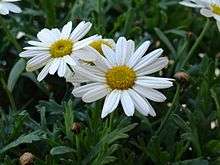Leucanthemum maximum
Leucanthemum maximum is a species of flowering plant in the aster family known by the common name max chrysanthemum.
| Leucanthemum maximum | |
|---|---|
 | |
| Scientific classification | |
| Kingdom: | Plantae |
| Clade: | Tracheophytes |
| Clade: | Angiosperms |
| Clade: | Eudicots |
| Clade: | Asterids |
| Order: | Asterales |
| Family: | Asteraceae |
| Genus: | Leucanthemum |
| Species: | L. maximum |
| Binomial name | |
| Leucanthemum maximum | |
Range
It is native to France and Spain but it can be found growing wild in other parts of the world as an introduced species and sometimes a garden escapee.
Description
It is a rhizomatous perennial herb growing 30 to 70 centimeters tall with many large serrated leaves around the base of the stem on winged petioles. There are smaller lance-shaped leaves alternately arranged along the stem. The inflorescence is generally a large, solitary flower head which may exceed 8 centimeters in diameter. It has a fringe of 20 to 30 white ray florets around a center of many densely packed yellow disc florets. The fruit is a small ribbed achene without a pappus.
Taxonomy
This species is one of the wild chrysanthemums Luther Burbank crossed to produce the popular garden hybrid known as the Shasta daisy, Leucanthemum × superbum.[1][2]
References
- Jepson Manual Treatment
- Chicago Botanic Garden. Chicago Botanic Garden evaluates Shasta daisy. Press Release. January 15, 2007.